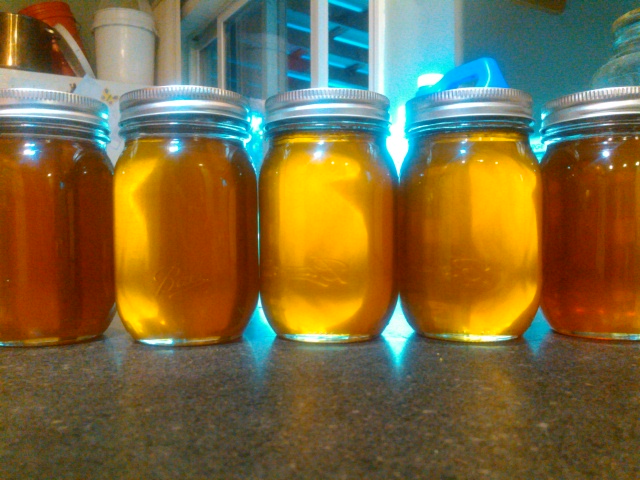Honey

Available year-round at Stone Family Farms, honey is one of the best natural sweeteners available. The physical properties of honey vary, depending on water content, the type of flora used to produce it, temperature, and the proportion of the specific sugars it contains. For pricing and availability click the read more button below.
Fresh honey is a supersaturated liquid, containing more sugar than the water can typically dissolve at ambient temperatures. At room temperature, honey is a supercooled liquid, in which the glucose will precipitate into solid granules. This forms a semisolid solution of precipitated glucose crystals in a solution of fructose and other ingredients.
Wild Flower Honey -- Currently available in light, medium, and dark.
- Large - Quarts (32 fl oz) - $16
- Medium - 24 fl oz - $12
- Small - Pints (16 fl oz) - $8
Honey FAQS
How should honey be stored?
Honey should be kept in dry storage at room temperature. Honey should never be stored in the refrigerator as dong so actually accelerates crystallization, the natural process in which the liquid in honey becomes solid. Honey stored in sealed containers can remain stable for decades and even centuries! However, it may darken and lose its aroma and flavor over time.
Are all honeys the same?
No way! The color, taste and aroma of honey changes depending on the floral source that the bees visit. Dark honeys tend to have more minerals and enzymes than light. Mass-produced "megastore" brands are usually pasteurized and filtered, which destroys much of honey's natural enzymes and pollen content. Using only raw or unfiltered honey assures you that all of the healthy benefits of the honey are present.
How is honey made?
The fascinating process of making honey begins when the bees feast on flowers, collecting the flower nectar in their mouths. This nectar then mixes with special enzymes in the bees' saliva, an alchemical process that turns it into honey. The bees carry the honey back to the hive where they deposit it into the cells of the hive's walls. The fluttering of their wings provides the necessary ventilation to reduce the moisture's content making it ready for consumption. Honey is a mix of natural sugars (80%), water (18%) and minerals, vitamins, pollen, protein and amino acids (2%). Around 70% of honey's natural sugar content is made up of fructose and glucose.
Is honey safe for young children and babies?
Do not feed honey or honey-containing products to infants less than one year of age. Their immune systems are not developed enough to handle some bacteria which naturally occurs in honey. Honey is a safe and healthful food for adults and children over the age of 12 months.
Can I substitute honey for sugar?
Yes, honey is a delicious, all-natural sweetener. When replacing sugar with honey in cooking and baking applications, follow these simple guidelines: To Cook with Honey: For sauces, marinades and salad dressings, substitute pure honey for up to half the granulated sweetener called for in your recipe (e.g., replace one cup of sugar with one-half cup of honey). To Bake with Honey: Use pure honey for up to half the granulated sweetener called for in your recipe. In addition, for each cup of honey used, reduce any added liquid by 1/4 cup, add 1/2 teaspoon baking soda, and reduce oven temperature by 25°F. Honey has a higher sweetening power than sugar, so you can use less honey than sugar.
What is the shelf life of honey?
Honey is the only food on the planet that will never spoil, so it has an indefinite shelf life – scientists have found honey in the Egyptian pyramids that is over 2,000 years old! Even at this ripe age, this ancient honey was found to be completely nutritionally and enzymatically intact. Honey will crystallize as it ages, but this does not affect the properties of the honey in any way.
What is the relationship between color and flavor?
Generally, lighter honeys have a milder flavor and darker honeys have a more robust flavor. Even though many exceptions exist (for example, basswood is light in color but has a strong flavor; tulip poplar honey is dark-colored and mild tasting), color is used throughout the industry as a convenient measure of flavor and aroma.
What should I do if my honey crystallizes?
Almost all honey will crystallize after extended storage. This does not affect its quality. Re-liquefy by placing the container in warm water, and allowing to stand for a short period.

